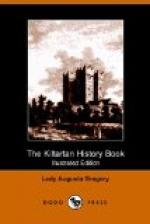“There was a young Napoleon there, the grandson of Napoleon the First, that was a great man indeed. I was in the island where he was interred; it is a grand place, and what is not natural in those parts, there are two blackthorn bushes growing in it where you go into the place he was buried. And as to that great Napoleon, the fear of him itself was enough to kill people. If he was living till now it is hard to say what way would the world be. It is likely there’d be no English left in it, and it would be all France. The young Napoleon was at the Zulu war was as fine a young man as you’d wish to lay an eye on; six feet four, and shaped to match. As to his death, there was things might have been brought to light, but the enquiry was stopped. There was seven of them went out together, and he was found after, lying dead in the ground, and his top coat spread over him. There came a shower of hailstones that were as large as the top of your finger, and as square as diamonds, and that would enter into your skull. They made out it was to save himself from them that he lay down. But why didn’t they lift him in the saddle and bring him along with them? And the bullet was taken out of his head was the same every bit as our bullets; and where would a Zulu get a bullet like that? Very queer it was, and a great deal of talk about it, and in my opinion he was done away with because the English saw the grandfather in him, and thought he would do away with themselves in the time to come. Sure if he spoke to one of them, he would begin to shake before him, officers the same as men. We had often to be laughing seeing that.”
PARNELL
“Parnell was a very good man, and a just man, and if he had lived to now, Ireland would be different to what it is. The only thing ever could be said against him was the influence he had with that woman. And how do we know but that was a thing appointed for him by God? Parnell had a back to him, but O’Connell stood alone. He fought a good war in the House of Commons. Parnell did a great deal, getting the land. I often heard he didn’t die at all—it was very quick for him to go. I often wondered there were no people smart enough to dig up the coffin and to see what is in it, at night they could do that. No one knows in what soil Robert Emmet was buried, but he was made an end of sure enough. Parnell went through Gort one day, and he called it the fag-end of Ireland, just as Lady Morgan called the North the Athens of Ireland.”




